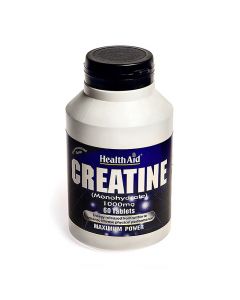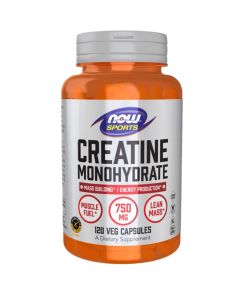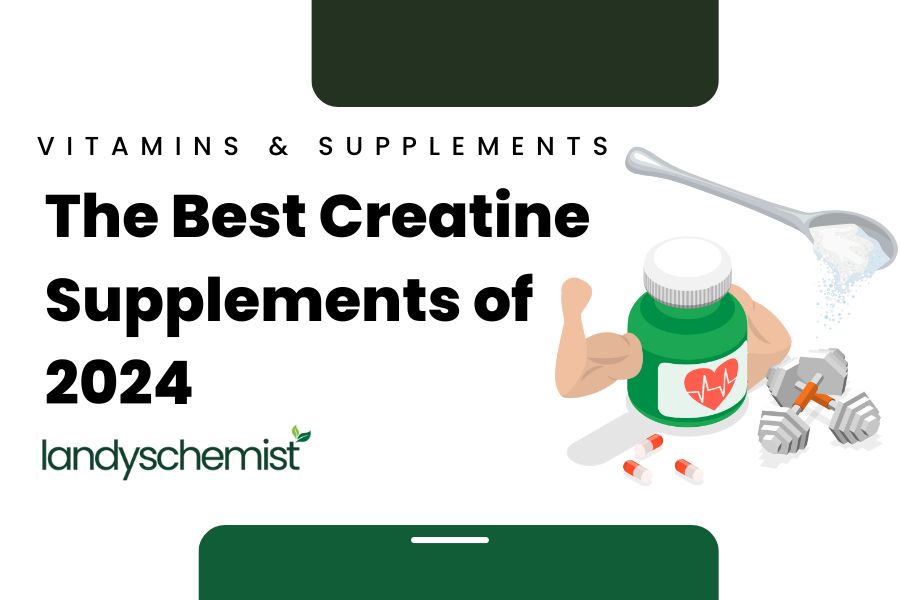
Best Creatine Supplements of 2024
Creatine is one of the most extensively researched supplements in the market. It's benefits extend far beyond improving gym performance, with creatine also proven to promote cognitive function and brain health. We're here to help you learn all there is to know about creatine and recommend the highest quality supplements of 2024.
What is Creatine?
Creatine is a naturally occurring compound found primarily in our muscles, but also in our brain. Creatine is synthesised in the body from amino acids and stored primarily as phosphocreatine within muscle tissue. During high intensity activities, phosphocreatine serves as an immediate reserve for adenosine triphosphate (ATP) generating bursts of energy for our cells.
Natural Sources of Creatine [i] :
- Red Meat
- Fish
- Seafood
- Milk
Although creatine is abundant in dietary sources, supplementing with creatine provides significantly higher levels of the compound.
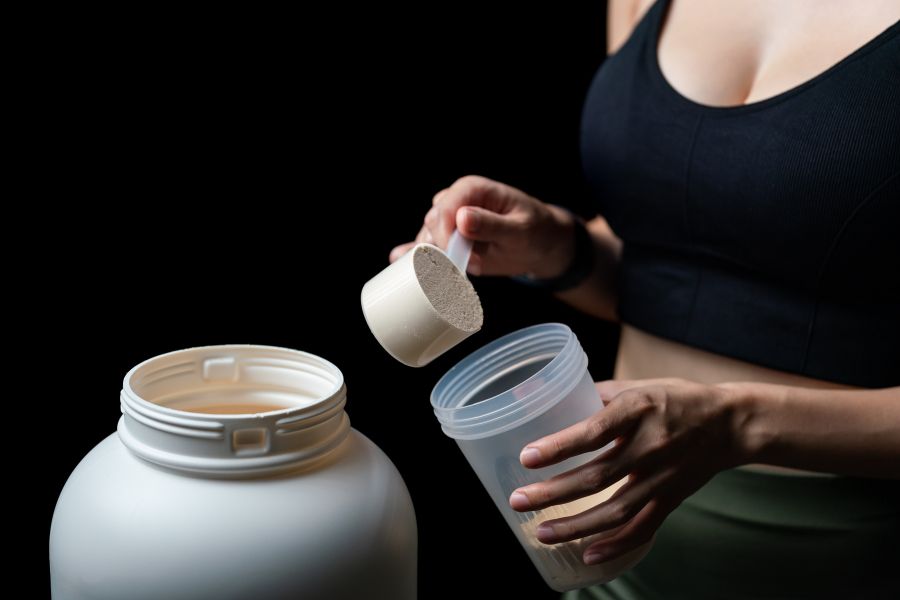
Benefits of Creatine Monohydrate:
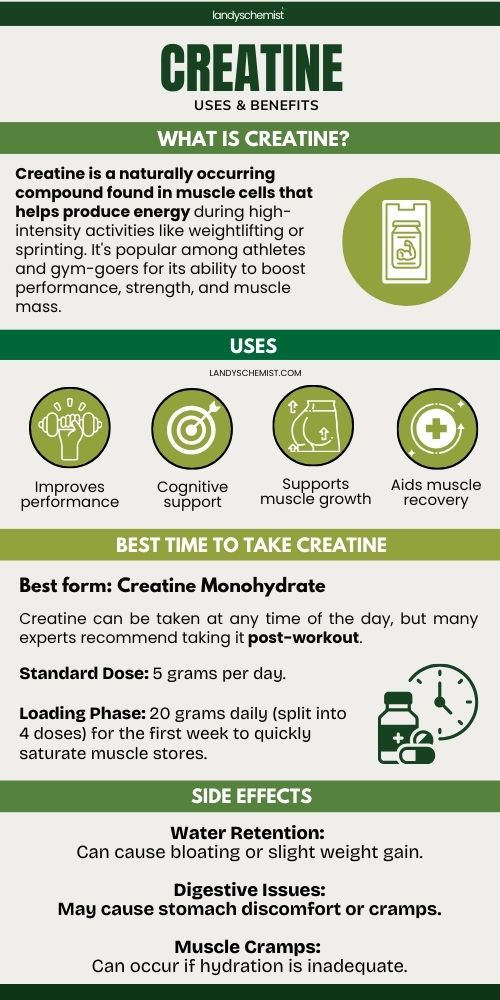
Physical Benefits
- Enhanced Strength and Endurance: Creatine supports the replenishment of ATP stores, providing rapid energy for high-intensity activities. This mechanism sustains muscle contractions, enhancing strength and endurance during exercise. Creatine supplementation has been reported to improve maximal power/strength by 5-15%[ii].
- Increases Lean Muscle Mass: By promoting water retention within muscle cells, creatine supports cellular hydration. This, combined with improved strength and training performance, contributes to increased lean muscle mass over time. A study found that creatine monohydrate can increase lifting potential by more than 30%[iii].
- Aids Muscle Recovery: Creatine helps reduce muscle cell dehydration and cramps, supports muscle protein synthesis, and aids the repair of muscle tissues, facilitating faster recovery and improved muscle repair.
Cognitive Benefits
- Supports Brain Health: Research indicates that creatine supplementation increases brain creatine content, with promising effects on mental clarity, focus, and short-term memory [iv].
- Improves Memory: Creatine plays a key role in brain health, and deficiencies have been observed in those with neurodegenerative conditions like dementia. A study concluded creatine supplementation enhances memory performance in healthy individuals, primarily in ageing adults [iv].
- Reduces Mental Fatigue: Higher ATP availability in the brain helps maintain energy levels, which improves alertness and reduces mental fatigue, enhancing overall focus. This is backed up by research proving creatine monohydrate can reduce the effects of sleep deprivation in humans and animals [v].
- Supports Mood and Well-Being: Emerging research suggests that creatine may positively impact mood and emotional health, with potential benefits for those experiencing low mood or stress.
What Is The Best Creatine Form To Take?
Creatine monohydrate is the most researched and widely recommended form of creatine, supported by hundreds of studies. Extensive studies proving the benefits of creatine use creatine monohydrate. We recommend it as the safest, most effective and most affordable form of creatine for both beginners and experienced users. Those with sensitive digestion may prefer micronised creatine, a finely ground form of monohydrate, as it is more soluble and easier to digest.
Creatine ethyl ester and buffered creatine are two other forms of creatine available. Some claim faster absorption or reduced side effects, however there is not sufficient scientific evidence to back these claims. We suggest sticking to creatine monohydrate.
Best Creatine Supplements:
Creatine supplements are widely available on the market, here are three of our best recommendations.
Ancient + Brave True Creatine+ Powder
This is our most highly recommended creatine product as its high-quality, trusted formula optimises both body and brain function. True Creatine+ powder combines high quality creatine monohydrate with taurine, magnesium and vitamin D, offering to support not only peak physical performance but also cognitive function, energy metabolism and bone health.
Key Benefits
- Higher bioavailability
- Supports muscles, bones and mind with added Taurine, Vitamin D, and Magnesium
- Neutral tasting formula, convenient for everyday use
HealthAid Creatine Monohydrate 1000mg Tablets
These 1000mg Creatine Monohydrate tablets are designed to support physical performance and help sustain muscle energy and strength. Perfect for those who prefer capsules over powder.
Key Benefits
- High quality 1000mg Creatine Monohydrate tablets
- Increases muscle strength and power for those who exercise often
- Easy to use, measured dosage
NOW Foods Creatine Monohydrate 750mg Capsules
A popular choice, NOW Foods capsules contain pure creatine monohydrate designed to physical performance and increase energy metabolism. These capsules offer flexible dosing with 6 capsules recommended per day making them perfect for beginners.
Key Benefits
- High quality 750mg Creatine Monohydrate tablets
- Improves growth of lean muscle mass and energy metabolism
- Measured, fast-absorbing formula with flexible dosing
Recommended Creatine Dosage
The recommended dosage of creatine varies based on product and goals. For most people, research recommends a daily maintenance dose of 3-5 grams of creatine monohydrate supports performance and recovery.
Many start with a “loading phase” of 20 grams daily (in 5-gram doses, four times daily) for 5-7 days to quickly saturate muscle stores and see faster results, shifting to the maintenance dose after this. For cognitive benefits, a sustained dose of 2-3 grams daily is effective.
When Should I Take Creatine?
Creatine can be taken at any time - morning, pre-workout, post-workout, before bed - the key to achieving results is consistent daily intake! Taking creatine around workouts may enhance its physical benefits, especially when paired with protein and carbs to boost absorption. Staying well-hydrated is also essential, as creatine increases water retention in muscles.
Safety and Side Effects:
Creatine is widely recognised as a safe and effective supplement for short and long-term use. Research has shown no harmful adverse effects when taking the recommended dosage of creatine.
Common side effects can usually be managed by staying hydrated and using the maintenance dose [vi]. They may include
- Bloating
- Muscle Cramps
- Dehydration
- Digestive Discomfort
It is important that those with pre-existing kidney or liver conditions consult a healthcare provider before use.
Summary
Creatine, specifically creatine monohydrate, is beneficial for physical strength and endurance, but also for cognitive function and brain health. Supplementation has been scientifically proven to help both mind and body, especially when paired with working out.
FAQ
How long does it take for creatine to start working?
Most people notice an increase in workout performance within 1 to 2 weeks of starting creatine supplementation. Muscle gains and improved strength may take longer, depending on the intensity of your workout routine.
How long should I take creatine for?
There’s no need to cycle off creatine. It can be taken continuously as part of your supplement routine. However, staying hydrated and following the recommended dosage is important.
Will creatine make me gain weight?
Creatine can cause weight gain, but this is mainly as a result of creatine promoting water retention within muscle cells . This is often temporary, and not to do with a build up of fat. Optimising hydration can help reduce this effect. Click here to learn more about creatine weight gain.
Is creatine better for women than men?
Study’s show women have 70-80% lower natural creatine stores than men, suggesting supplementation could have a greater impact [vii]. Some studies also suggest creatine may be beneficial for women throughout different stages of the menstrual cycle. However, the effects of creatine on women remain largely understudied.
Is the “loading phase” necessary when supplementing creatine?
The loading phase may be recommended for those looking to benefit from strength gains and faster results, but is not necessary.
Should creatine be taken before bed?
Creatine is a versatile supplement and can be taken at any time of day. There is no evidence to suggest taking creatine before bed can negatively impact results of creatine. For further information, click here.
References
[i] https://pmc.ncbi.nlm.nih.gov/articles/PMC3407788/
[ii] https://pubmed.ncbi.nlm.nih.gov/12701815/
[iii] https://pubmed.ncbi.nlm.nih.gov/10449017/
[iv] https://pmc.ncbi.nlm.nih.gov/articles/PMC10721691/
[v] https://pmc.ncbi.nlm.nih.gov/articles/PMC10721691/


